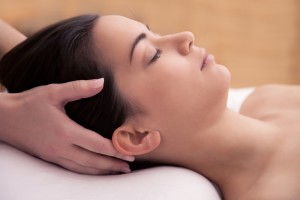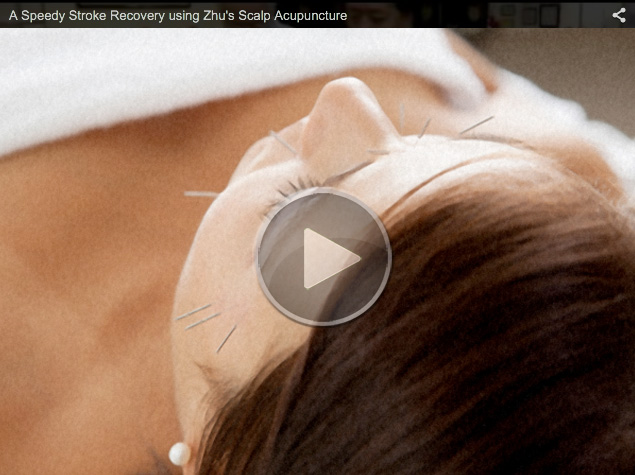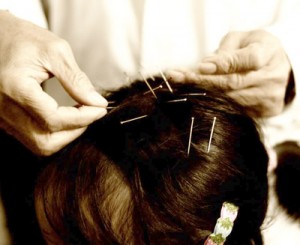Chinese Scalp Acupuncture (CSA ) is a relatively new branch of acupuncture practice. Starting with Dr. Jiao in the 1970s, and perfected by Jason Hao DOM in the 1990s, this form of acupuncture directly addresses recent and long-standing neurological issues, sometimes with dramatic results.
) is a relatively new branch of acupuncture practice. Starting with Dr. Jiao in the 1970s, and perfected by Jason Hao DOM in the 1990s, this form of acupuncture directly addresses recent and long-standing neurological issues, sometimes with dramatic results.
While the mechanism of this remarkable technique needs further clarification, hundreds of patients in the American southwest have attested to partial or full resolution of difficult to manage neurological conditions, or to remarkable ongoing management of degenerative neurological issues. Some neurological problems can expect recovery, as after stroke. These conditions tend to show accelerated recovery with CSA. Some other neurologic conditions, like essential tremor or MS, are degenerative or permanent, yet still may show rapid, remarkable improvements. While these improvements may be impermanent, they may greatly improve symptoms and quality of life when administered regularly.
You can view accelerated resolution of an illness that typically resolves more slowly, performed by Dr. Zhu in San Jose, CA. This video follows the 13-day recovery a hemiplegic man, beginning several days after sustaining an ischemic stroke. He undergoes physical therapy while undergoing scalp acupuncture. You witness the changes in his ability to move his arm, grasp, catch, walk and speak while the needles are in place. While recovery from his stroke is expected, normal rehabilitation time is weeks-to-months, not days. Dr. Zhu lectures throughout her region on the benefits of her style of CSA, which is essentially the same as Dr. Hao’s. Visit Dr. Zhu’s website here.

Dr. Villanova first witnessed CSA at the hands of respected Detroit neurologist Mitchell Elkiss, DO. Dr. Elkiss demonstrated CSA on an MS patient with the following symptoms: marked leg spasticity, inability to walk more than eight steps, low back pain, severe nystagmus, and marked optic neuritis (requiring her Kindle to be set at one to two words per page, and held 2 inches from her face). After her treatment, the patient reported that her low back pain had resolved, and that her spasticity was markedly improved, she walked 24 steps, had objectively/visibly improved nystagmus, and, most remarkably, had enhanced ability to read: she could now read her Kindle at 2 print sizes smaller while holding it at arm’s length. This demonstration motivated Dr. Villanova to learn this breathtaking technique. It should be made clear that with any degenerative condition such as MS, these improvements are not permanent, but scalp acupuncture can comprise an extremely robust and effective component of symptom management, one that superbly complements a neurologist’s medical management.
Since this is a newer field, there are few large studies about it. However, Dr. Hao has posted one of his MS case studies here.
Dr. Villanova has been trained by Dr. Hao, and has now had excellent results using CSA for multiple sclerosis, vertigo/dizziness, tinnitus, gait unsteadiness, restless le g syndrome and essential tremor. CSA may comprise all or part of your treatment, depending on the severity and complexity of your neurological problem. While training with Dr. Hao, she observed over a half dozen MS patients demonstrate improvements, as well as a near complete reversal of long-standing post polio partial paralysis, 13-years’ duration Bell’s palsy, paralysis, essential tremor, Parkinson’s gait disturbance and tremor, apraxia, and marked improvement in spastic paresis. Again, the chronic conditions may require ongoing care, but conditions like spinal cord injury or stroke, if they improve with the treatment, usually achieve long-standing gains.
g syndrome and essential tremor. CSA may comprise all or part of your treatment, depending on the severity and complexity of your neurological problem. While training with Dr. Hao, she observed over a half dozen MS patients demonstrate improvements, as well as a near complete reversal of long-standing post polio partial paralysis, 13-years’ duration Bell’s palsy, paralysis, essential tremor, Parkinson’s gait disturbance and tremor, apraxia, and marked improvement in spastic paresis. Again, the chronic conditions may require ongoing care, but conditions like spinal cord injury or stroke, if they improve with the treatment, usually achieve long-standing gains.
Please contact Dr. Villanova if you have more questions about whether or not CSA may benefit you.
Scalp Acupuncture Testimonials
“Chinese Scalp Acupuncture”. Jason Ji-shun Hao, Linda Ling-zhi Hao and Honora Lee Wolfe. Blue Poppy Press; 1st Edition. (November, 2011)
